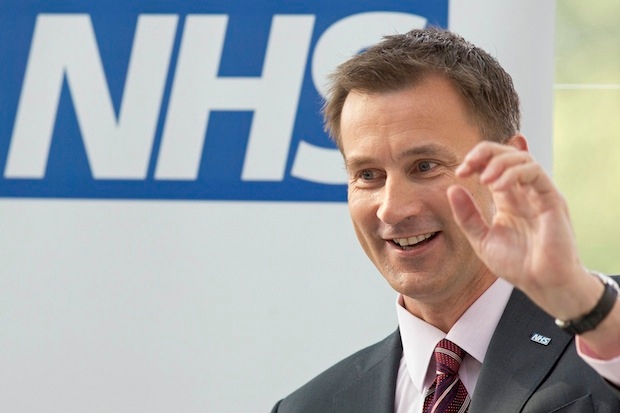Jeremy Hunt has not done himself any favours in the past with his comments about junior doctors. But today – the first time junior doctors have ever walked out without providing emergency cover – was the time for sounding conciliatory. The Health Secretary said it was a ‘very, very bleak day for the NHS’. Hunt went on to add that:
‘The reason this has happened is because the Government has been unable to negotiate sensibly and reasonably with the BMA over a manifesto pledge’.
His emphasis on the Conservative’s ‘manifesto pledge’ is a clear part of the Health Secretary’s tactics to win over the public and Hunt repeated his focus on this point several times during his interview on the Today programme. Put simply, the argument goes that the British people voted for it, but it’s the BMA getting in the way of it being put into place.
Hunt certainly isn’t wrong about this being a manifesto pledge: the Conservatives promised to ‘deliver a truly 7-day NHS so you will always have access to a free and high quality health service when you need it most’. But what the BMA are likely to say is that it’s the way in which the negotiations have taken place that has contributed to the problem. That’s certainly the viewpoint of Calum Miller writing in the Spectator earlier this month, who said that whilst Hunt is a fool, the junior doctors’ strikes are becoming embarrassing.
This point over how the contract dispute has been handled gives an insight into Hunt’s second strand of argument which he made this morning. By adopting a measured, conciliatory tone and saying things like ‘the last thing we are doing is itching for a fight’ – and talking up the hard work done by junior doctors – he is now doing his best to paint the BMA as the aggressor.
In fairness to the BMA, both sides have hardly painted themselves in glory over this dispute. But now that Hunt is appearing to soften his tone, they face a dilemma: if they continue to go on the attack, they risk alienating the public who are slowly but surely becoming less sympathetic to their cause. A survey by YouGov showed only 24 per cent of people backed a full strike compared to the 35 per cent who said they strongly supported a partial strike. However, because of the viciousness with which this dispute has played out so far, it’s difficult to see how the BMA can imitate Hunt in adopting a conciliatory tone. It’s also tricky to see how, given the focus of blame directed so specifically at the Health Secretary, the BMA will be able to do this either. At such a crucial time, where public support is ebbing away for junior doctors, Hunt’s belated charm offensive may well win the day.







Comments